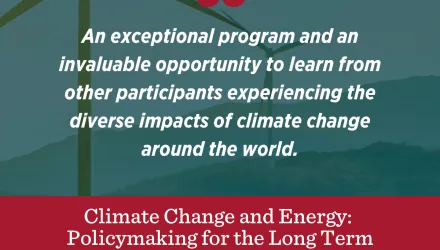Summary
A combination of factors pose significant barriers to developing effective and efficient portfolios of policies to achieve long-run climate policy objectives. Among these factors are political opposition to particular types of policy mechanisms; challenges converting local concern about the climate to efficient policies, given the global-commons, stock-pollutant nature of the climate problem; technical challenges in designing low-GHG energy systems; and coordination challenges among nations given free-rider incentives. Given these factors, the design of current climate policies ought to consider the sequence of policy design, with the aim of transitioning over time to more effective and efficient climate policies.
This paper evaluates factors affecting the potential to transition over time to more efficient long-run climate policies, including the sequence of policies to be adopted. By considering these factors, policymakers can increase the likelihood that more efficient policies emerge from the current suite of less-efficient measures being pursued by some national and sub-national governments.
To make these concepts tangible, we focus on the state of Oregon, which is currently contemplating the adoption of a GHG cap-and-trade system. Policies that create GHG pricing, such as a cap-and-trade system, are the foundation of an economically efficient climate policy. But the immediate transition to GHG pricing at efficient price levels is politically tenuous. Thus, in the interim, many jurisdictions pursue less efficient (and less effective) policies that pass political muster. We consider how governments, such as the State of Oregon, might transition from these less-efficient policies to more efficient GHG pricing policies over time.
Robert Stavins
Harvard University
Todd Schatzki
Rebecca Scott
Analysis Group, Inc.
Stavins, Robert N, Todd Schatzki and Rebecca Scott. “Transitioning to Long-Run Effective and Efficient Climate Policies.” April 2019





